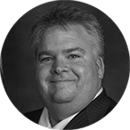In the SecureWorld Spotlight Series, we learn about the speakers and Advisory Council members that make our events a success. In Q&A format, they share about their professional journeys, unique experiences, and hopes for the future of cybersecurity—along with some personal anecdotes.

Gene Kingsley has worked as a dedicated resource in the Information Security space for more than 25 years, among industries such as Higher Ed, Healthcare, Finance, Federal Government agencies, and others. He has focused on Operations, Strategy, and Resiliency. In his spare time, he volunteers as a national leader among the InfraGard National Members Alliance, assisting in governance, audit, and program development.
Get to know Gene Kingsley
Q: Why did you decide to pursue cybersecurity as a career path?
A: My path to the cybersecurity field wasn't obvious from the beginning. Growing up, my initial goal was to become a Drug Enforcement Administration (DEA) agent. My father was a Chief Coast Guard recruiter, so I grew up in and around military bases. It seemed natural to join the service, but my passion was in law enforcement. The military has plenty of law enforcement options, so I thought about joining the Coast Guard and working in a unit to combat international drug trafficking. I always had an inclination for the sciences, as well, and my mother ran a pharmacy that helped people with intravenous therapies. I attended a local community college and earned an associate degree in Veterinary Science before going on to study Pharmacy in the first pharmacy school in the United States, the Philadelphia College of Pharmacy and Science (PCPS).
It was a fantastic school, attended by both Benjamin Franklin and Thomas Jefferson. I was following in great footsteps until one life-altering day. I was with a group of about ten students, and we were lined up at the curb to cross the street at Woodland Ave. A car stopped to allow us to cross, but midway through the crosswalk, the driver gunned his vehicle and plowed through the lot of us. I was seriously injured, along with another student. PCPS granted me a medical leave, and I took the next 18 months to attend physical therapy sessions and learn to walk again.
During my recovery and rehabilitation, I attended Westfield State College and obtained my B.S. in Criminal Justice. When I graduated, I attempted to apply to the DEA and learned that President Bill Clinton had placed a hiring freeze on federal employees. So, I thought, now what? While I was in school, I had worked in computer labs to help pay the bills. I applied at a local shop and worked as a field tech, ultimately helping the business add a new line of service for internet business capabilities. After that, I became a help desk manager for a local college and worked my way up to Director of Information Security. I chose information security because it fit my history. I had studied and worked in law enforcement and was comfortable around computers. I thought it was a natural fit that would pay well and have a bright future; I was right. Ever since, I have enjoyed working in cybersecurity in many industries. While it wasn't the path I originally envisioned, I know that cybersecurity is where I was meant to be. My career has given me numerous opportunities to make a positive difference.
Q: How would you describe your feelings about cybersecurity in one word?
A: EXCITING! You may have heard, I love my job. It's such a great feeling waking up every day and knowing I am doing my part to help keep people and their data safe and secure.
Q: What has been your most memorable moment thus far working in cybersecurity?
A: I am a huge fan of learning. My most memorable moment in cybersecurity involved forensics; specifically, helping to provide artifacts that proved the existence of a love triangle, workplace coercion, and nepotism. Another memorable moment involved the discovery of evidence of a planned murder. By far, though, my favorite moments almost always involve teaching someone a skill and seeing that sparkle in their eyes when they understand the concept and repeat that skill consistently. Transferring my knowledge and passion for the field is what I enjoy most.
One summer, I taught a computer security class for young students who were there with their parents. As I looked across the classroom at one particular student, I could see he was struggling. His father did not speak English as a first language, and I could see the frustration and sadness on his face because he wanted to help his child succeed. I walked over and found a way to help the father help his child. They were both ecstatic and overjoyed when they got the program to work. I like to think that's the reason, that moment, that sealed the deal. That student is now running his own forensics shop and his father works for him. They are quite successful. I'm glad I may have played a small part in that.
Q: If you had to choose, what's the one cybersecurity practice people can adopt that would have the greatest impact?
A: The cybersecurity practice that would have the greatest positive impact—for anyone and everyone—is to use multi-factor authentication (MFA) everywhere you have data you want to protect.
Q: What is an industry-wide change you would like to see happen in the future?
A: I would like to see more balance in the roles between men and women in cybersecurity. I think that would significantly benefit our industry.
Q: If you could pass or change one regulation/law in cybersecurity and data protection, what would it be and why?
A: I would like to see the American Cybersecurity Literacy Act come to fruition. It would be a game-changer to see every individual in America trained in basic cybersecurity risk reduction methods.
Q: What encouraged you to join your current organization (employer)?
A: My current organization, Farm Credit, is fantastic! It's got a great culture and an outstanding mission. Farm Credit is responsible for helping farmers, fisheries, and people who live in rural areas to obtain loans and keep their farms operational with very affordable and innovative strategies. As many of you reading this know, I am also honored to serve as the Vice President of InfraGard National Members Alliance, an FBI-affiliated independent nonprofit organization. Our mission to protect critical infrastructure and the American people through education and outreach is phenomenal. Over 80,000 people nationwide are members of the FBI's InfraGard program, and they truly care about protecting America. So my career and my nonprofit service truly align. As part of the Farm Credit System, I help banks across the U.S. stay resilient and secure in three critical infrastructure fields: Food and Agriculture, Financial Services, and Information Technology. My job is always exciting and ever-changing. I am so honored to work in this position with phenomenal leadership at Farm Credit. They say if you love your job, you never work a day in your life. I LOVE my job!
Q: What do you wish more people knew about your organization?
A: I wish more people knew to look into their local Farm Credit organizations. There are over 70 across America, and many employees enjoy remote work. The culture and opportunities for fulfilling and purposeful employment are truly phenomenal.
Q: What are you most looking forward to at SecureWorld this year?
A: I am most looking forward to meeting people, interacting with my fellow cybersecurity practitioners, learning what they are focusing on, and seeing if we can help each other discover new strategies and resolve issues. I always learn so much from my peers. Every year, I see familiar faces, forge new friendships, and exchange thoughts and laughs with them all. It's truly one of my favorite events of the year.
To connect with Gene and other cybersecurity leaders from the greater Boston area, attend the 19th annual SecureWorld Boston conference on March 22-23, 2023. Gene will present a session on "Maximizing Cloud Security Posture Management for Enhanced Protection." See the conference agenda and register here.
Continue to follow our Spotlight Series for more highlights from industry experts.




